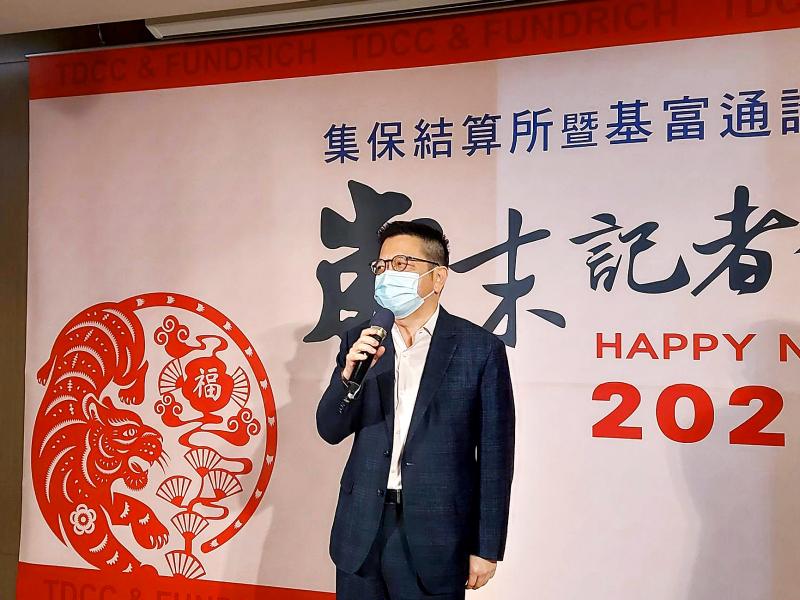Publicly listed companies are to be able to choose whether to hold annual shareholders’ meetings entirely or partly by videoconference, the Taiwan Depository and Clearing Corp (TDCC, 台灣集中保管結算所) said yesterday.
Although the COVID-19 pandemic has limited public gatherings since the beginning of 2020, listed companies have not been allowed to hold annual shareholders’ meetings completely over videoconference, partially due to regulators’ concerns over cybersecurity and protecting shareholders’ interests.
As regulations have been amended to allow for virtual shareholders’ conferences, the TDCC is altering its information system to facilitate videoconferencing of shareholders’ meetings this year, chairman Sherman Lin (林修銘) told a news conference in Taipei.

Photo: Chen Yung-chi, Taipei Times
“It is possible that we will see two ways in which a shareholders’ meeting is held this year — a company should be able to choose whether it wants a pure virtual meeting, or hold a physical meeting while allowing some shareholders to attend through a videoconferencing tool,” Lin said.
The rules set by the Financial Supervisory Commission would regulate what kind of companies are eligible to convene shareholders’ meetings virtually, Lin added.
Companies that plan to have crucial shareholders proposals addressed at their meetings, such as those involving management disputes, would likely be barred from holding such a meeting entirely over videoconference to prevent controversy, the agency said.
Seventeen companies held physical meetings while allowing virtual attendance last year, compared with 1,744 public companies that could not, agency data showed.
More companies are expected to employ videoconferencing tools to hold virtual meetings as a supplement to in-person meetings this year, the agency said.
Amendments to the Company Act (公司法) passed last month enable private companies to freely convene shareholders’ meetings completely by videoconferencing from this year, but impose more rules on public companies to ensure shareholders’ rights are preserved.
The commission plans in March to unveil new rules regulating how public companies hold virtual shareholders’ meetings.
TDCC yesterday reported a record net profit of NT$6 billion for last year, with earnings totaling NT$13 per share, and its FundRich Securities Co Ltd (基富通) unit moved into the black, recording net profit of NT$130 million, it said.

Taiwan Transport and Storage Corp (TTS, 台灣通運倉儲) yesterday unveiled its first electric tractor unit — manufactured by Volvo Trucks — in a ceremony in Taipei, and said the unit would soon be used to transport cement produced by Taiwan Cement Corp (TCC, 台灣水泥). Both TTS and TCC belong to TCC International Holdings Ltd (台泥國際集團). With the electric tractor unit, the Taipei-based cement firm would become the first in Taiwan to use electric vehicles to transport construction materials. TTS chairman Koo Kung-yi (辜公怡), Volvo Trucks vice president of sales and marketing Johan Selven, TCC president Roman Cheng (程耀輝) and Taikoo Motors Group

Among the rows of vibrators, rubber torsos and leather harnesses at a Chinese sex toys exhibition in Shanghai this weekend, the beginnings of an artificial intelligence (AI)-driven shift in the industry quietly pulsed. China manufactures about 70 percent of the world’s sex toys, most of it the “hardware” on display at the fair — whether that be technicolor tentacled dildos or hyper-realistic personalized silicone dolls. Yet smart toys have been rising in popularity for some time. Many major European and US brands already offer tech-enhanced products that can enable long-distance love, monitor well-being and even bring people one step closer to

New apartments in Taiwan’s major cities are getting smaller, while old apartments are increasingly occupied by older people, many of whom live alone, government data showed. The phenomenon has to do with sharpening unaffordable property prices and an aging population, property brokers said. Apartments with one bedroom that are two years old or older have gained a noticeable presence in the nation’s six special municipalities as well as Hsinchu county and city in the past five years, Evertrust Rehouse Co (永慶房產集團) found, citing data from the government’s real-price transaction platform. In Taipei, apartments with one bedroom accounted for 19 percent of deals last

RECORD-BREAKING: TSMC’s net profit last quarter beat market expectations by expanding 8.9% and it was the best first-quarter profit in the chipmaker’s history Taiwan Semiconductor Manufacturing Co (TSMC, 台積電), which counts Nvidia Corp as a key customer, yesterday said that artificial intelligence (AI) server chip revenue is set to more than double this year from last year amid rising demand. The chipmaker expects the growth momentum to continue in the next five years with an annual compound growth rate of 50 percent, TSMC chief executive officer C.C. Wei (魏哲家) told investors yesterday. By 2028, AI chips’ contribution to revenue would climb to about 20 percent from a percentage in the low teens, Wei said. “Almost all the AI innovators are working with TSMC to address the